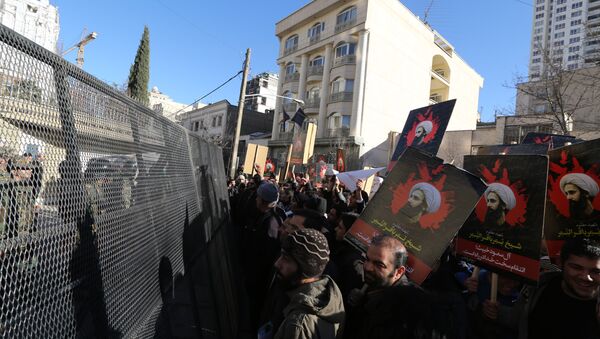WASHINGTON (Sputnik) — On January 2, Riyadh executed top Shiite cleric Sheikh Nimr al-Nimr, inciting a response in Tehran, where the Saudi embassy was stormed by protestors. On Monday, Saudi Arabia formerly severed diplomatic ties with Iran.
“After the execution of Nimr al-Nimr one would have expected Iran to suspend diplomatic ties with Saudi Arabia,” New York-based foreign affairs analyst Joe Lauria told Sputnik. “The fact that it was the other way around indicates this was a well-thought-out provocation by Riyadh.”
US author and Middle East historian Gareth Porter agreed that Riyadh appeared to be following one provocation to Tehran after another.
“I would simply underline the fact that the Saudis are deliberately precipitating a crisis in the hope that it will force the United States to be more anti-Iran. I doubt that it will work,” Porter told Sputnik.
Lauria argued that Saudi King Salman bin Abdul Aziz and his son, 30-year-old Defense Minister Mohammed bin Salman, had led the country into a series of stinging foreign policy humiliations and failures and were seeking to distract public attention by provoking a crisis with Iran.
“It appears that the failure of the Saudis to win in Yemen, the reversal of the fortunes of the extremists it backs in Syria after the Russian intervention, and above all the Iranian nuclear deal have put the Saudi leadership, particularly the young defense minister, under extreme pressure.”
Prince Mohammed bin Salman, who is also second in line to the throne as deputy crown prince, threw his own prestige into the war in Yemen and is now gambling with even higher stakes in taking acts calculated to enrage the Iranians, Lauria noted.
“He cannot afford to lose ‘his’ war in Yemen. So Sunnis are being riled up against Iran and Iranian-back Shia in what looks like a reckless gambit to maintain its regional influence,” the analyst said.
Saudi Arabia’s growing economic crisis caused by the global slump in oil prices was also a factor in motivating the policy of confrontation, Lauria suggested.
“Some analysts are saying that this is about a faltering economy and a need to distract the population from a reduction of pay outs that have kept them in line over the decades.”
The entire Middle East was likely to suffer from Riyadh’s rejection of efforts to build diplomatic bridges to Tehran, Lauria warned.
“This is all the more disturbing because last month high-level talks between Iran and Saudi Arabia were announced-now no doubt canceled. Without a Saudi-Iranian accommodation crises across the region from Lebanon to Yemen will remain on the boil.”
Bahrain, the United Arab Emirates, and Sudan joined Saudi Arabia in cutting all their diplomatic ties with Iran on Monday.
“Commercial ties between Saudi Arabia and Iran are nowhere near what they are between Iran and the United Arab Emirates (UAE). If you see the Emirates suspend [its ties] to Iran, then we know this is a major provocation by the Saudi-led Gulf Cooperation Council (GCC),” Lauria added.
Porter predicted that because of Washington’s inability to rein in the Saudis, the crisis was likely to get steadily worse.
“After these Saudi provocations, [relations] will become no doubt worse. How much worse is anyone's guess… but I also have little hope that [US President Barack] Obama is capable of forcing the issue of irresponsible and destructive Saudi behavior with Riyadh.”
In December, Riyadh and Tehran announced they would hold high-level talks to try and improve relations, but those negotiations would probably become a casualty of the new escalating tensions, Porter advised.

